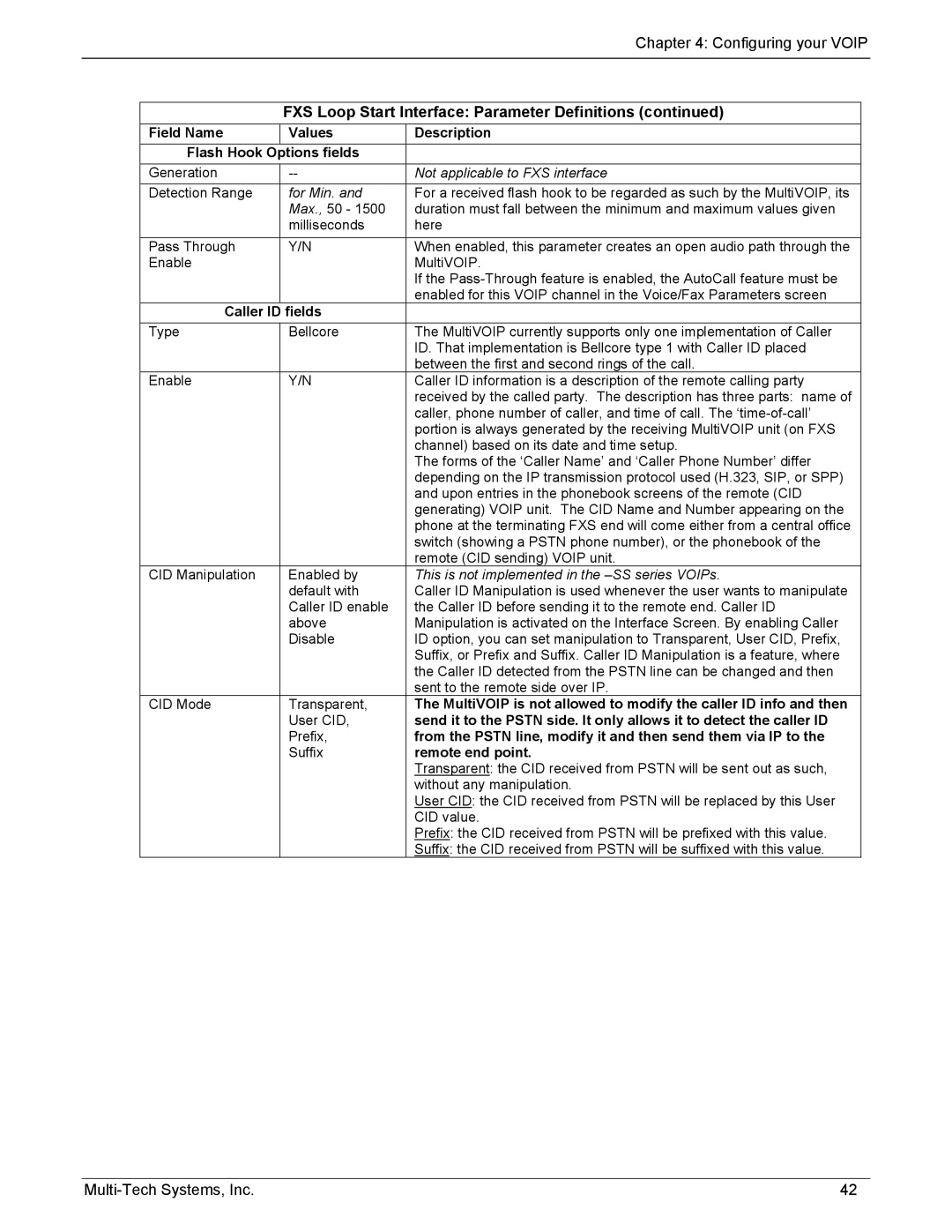|
|
| Chapter 4: Configuring your VOIP | |
|
|
|
|
|
|
|
|
|
|
|
| FXS Loop Start Interface: Parameter Definitions (continued) | ||
| Field Name | Values | Description |
|
| Flash Hook Options fields |
|
| |
| Generation | Not applicable to FXS interface |
| |
| Detection Range | for Min. and | For a received flash hook to be regarded as such by the MultiVOIP, its |
|
|
| Max., 50 - 1500 | duration must fall between the minimum and maximum values given |
|
|
| milliseconds | here |
|
| Pass Through | Y/N | When enabled, this parameter creates an open audio path through the |
|
| Enable |
| MultiVOIP. |
|
|
|
| If the |
|
|
|
| enabled for this VOIP channel in the Voice/Fax Parameters screen |
|
| Caller ID | fields |
|
|
| Type | Bellcore | The MultiVOIP currently supports only one implementation of Caller |
|
|
|
| ID. That implementation is Bellcore type 1 with Caller ID placed |
|
|
|
| between the first and second rings of the call. |
|
| Enable | Y/N | Caller ID information is a description of the remote calling party |
|
|
|
| received by the called party. The description has three parts: name of |
|
|
|
| caller, phone number of caller, and time of call. The |
|
|
|
| portion is always generated by the receiving MultiVOIP unit (on FXS |
|
|
|
| channel) based on its date and time setup. |
|
|
|
| The forms of the ‘Caller Name’ and ‘Caller Phone Number’ differ |
|
|
|
| depending on the IP transmission protocol used (H.323, SIP, or SPP) |
|
|
|
| and upon entries in the phonebook screens of the remote (CID |
|
|
|
| generating) VOIP unit. The CID Name and Number appearing on the |
|
|
|
| phone at the terminating FXS end will come either from a central office |
|
|
|
| switch (showing a PSTN phone number), or the phonebook of the |
|
|
|
| remote (CID sending) VOIP unit. |
|
| CID Manipulation | Enabled by | This is not implemented in the |
|
|
| default with | Caller ID Manipulation is used whenever the user wants to manipulate |
|
|
| Caller ID enable | the Caller ID before sending it to the remote end. Caller ID |
|
|
| above | Manipulation is activated on the Interface Screen. By enabling Caller |
|
|
| Disable | ID option, you can set manipulation to Transparent, User CID, Prefix, |
|
|
|
| Suffix, or Prefix and Suffix. Caller ID Manipulation is a feature, where |
|
|
|
| the Caller ID detected from the PSTN line can be changed and then |
|
|
|
| sent to the remote side over IP. |
|
| CID Mode | Transparent, | The MultiVOIP is not allowed to modify the caller ID info and then |
|
|
| User CID, | send it to the PSTN side. It only allows it to detect the caller ID |
|
|
| Prefix, | from the PSTN line, modify it and then send them via IP to the |
|
|
| Suffix | remote end point. |
|
|
|
| Transparent: the CID received from PSTN will be sent out as such, |
|
|
|
| without any manipulation. |
|
|
|
| User CID: the CID received from PSTN will be replaced by this User |
|
|
|
| CID value. |
|
|
|
| Prefix: the CID received from PSTN will be prefixed with this value. |
|
|
|
| Suffix: the CID received from PSTN will be suffixed with this value. |
|
42 |
